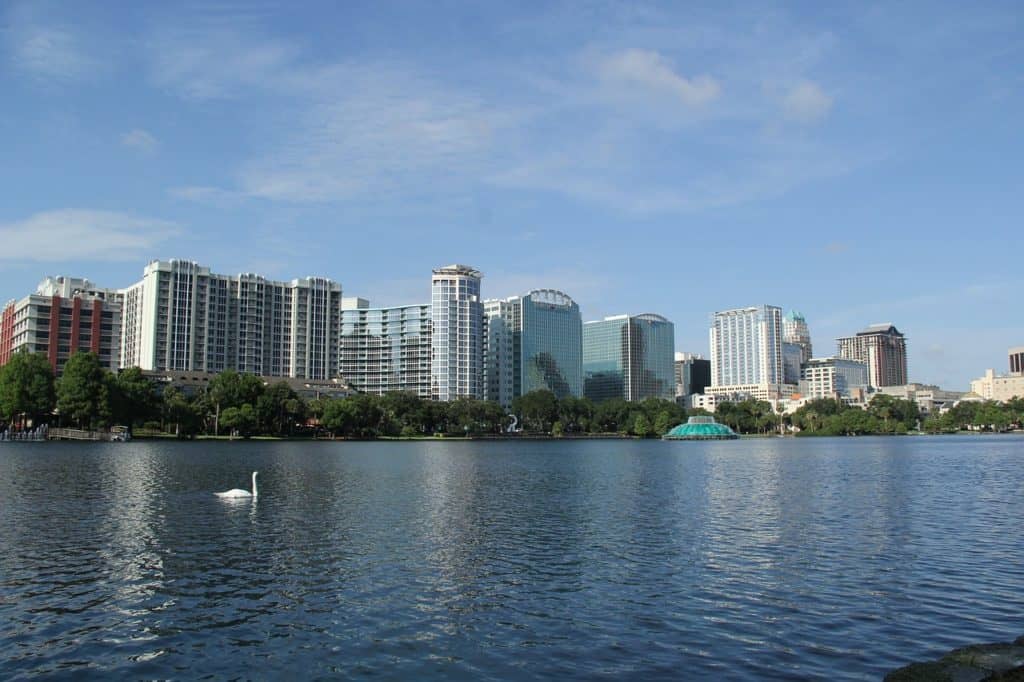Florida is transforming. It’s not a state just for vacationers and retirees. Florida is one of the top states people are moving to and many new Floridians are choosing the Orlando area. In 2019, The Orlando Economic Council published a report that the area will add 1,500 per week for the next 11 years. The Orlando area’s growth has made it the nation’s 4th fastest growing city, according to Forbes in 2018. So, why are so many people moving to Central Florida?
Orlando quickly rose to the top of our short list of places where we wanted to settle down when my husband retired from the military. Before then, we saw Orlando as just a place where we vacationed. We had a great time, loved the weather (except for July and August), but we didn’t think of Orlando as a place where people lived. But once we explored the community outside of the theme parks after our 2016 vacation, we realized we had found where we wanted to settle down. Some of the top reasons we wanted to move to Central Florida were:
- No state income tax
- Lower cost of living relative to the areas we lived
- Quality public schools in the area we wanted to live (but do your research)
- Weather
- Activities (theme parks, museums, concerts, arts, and events)
- Outdoor activities possible all year long
- Florida’s natural beauty and rich history
- Nearby major and minor league sports teams
- Easily accessible international airports, rail stations, and ports for work and personal travel
What is it like to live in Orlando?
Although living in the Orlando area is not like being on vacation 24/7, we absolutely love all there is to do in our community in our down time. And it does feel like you are on vacation some of the time, especially when you are relaxing at the pool or beach while your friends and family are shoveling snow in the winter. If you have only experienced Orlando’s many attractions, let me tell you that there is so much more to discover. Here is a list of things to think about when planning a move to the Orlando area:
Central Florida Counties
Orlando is located in Orange County, but Orange County is surrounded by five other counties: Seminole, Osceola, Brevard, Lake, Polk, and Volusia. Learning more about each county and their unique character and communities is a great starting point to planning your move.
Schools
If you have children or plan on having children while you reside in Central Florida, researching schools in each of the area’s six counties is another preliminary step to finding where to you might want to live and work.
Transportation
Getting around Central Florida can be difficult, mainly because of the multiple construction projects, but you can finds ways around major construction. Learn about all of the major highways and tolls roads in the Orlando area, as well as the public transportation offerings that you might use. One thing you will also learn about the area is that most locations are spread out, so if you live outside of the City of Orlando, a reliable car is essential.
Housing
Florida offers a variety of housing and community types – each with unique pros and cons. We rented a townhouse for a year and then purchased a home. Maybe you want to rent an apartment, build a new house, or buy a charming Southern home on a lake. All of these options come with many considerations and you should research and plan carefully before signing a lease or contract to buy.
Jobs
The Orlando job market is tough. It is competitive, tends to offer lower wages than expected, and advanced education can be a negative. However, research suggests trends towards a more diverse and educated workforce and higher wages. Working remotely and/or have a flex schedule is also growing in popularity in Central Florida, especially with the pandemic, but that varies depending on the position and the employer. Networking and connecting with local recruiters can help with you job search.
Cost of Living
Orlando’s Cost of Living is about 5% below the national average, but some things cost more in Orlando compared to the national average like food and auto insurance. It is much cheaper to live in Orlando, however, compared to major cities in the Northeast, Midwest, and California. There is also no personal state income tax in Florida. Electricity, housing, gas, healthcare, and commuting costs are often are lower in Orlando than the rest of the U.S. On average, your dollar will stretch further in Central Florida than the rest of the country.
Weather
Yes, Central Florida does gets hot and muggy. I happily trade the heat and humidity, though, for shoveling snow and freezing temps in the winter. Orlando’s average high is 83 degrees and the average low is 62. The hottest month is typically July and the coolest month is usually January. Afternoon thunderstorms are a part of Florida summers beginning in late May. A dry season begins in the winter following the hurricane season that begins June 1 and extends through November. Hurricanes are definitely a concern, but the inland parts of the Orlando area is one of the safest places to be during a hurricane because of its distance from the shore – that’s why Walt Disney decided to build his second park in the Orlando area, not in Tampa or Miami.
Food and Drink
Orlando has thousands of restaurants – something for every pallet. In addition to the restaurants, Central Florida is home to some notable craft breweries, coffee houses, and amazing farmer’s markets. The theme parks have stepped up their food game too. So many great food and drink options exist here that new residents usually add a few pounds. You’ve been warned!
Events and Festivals
Since the weather is so pleasant most of the year, there always seems to be a an event or festivals to enjoy on the weekends. This is one of our favorite parts of the Central Florida lifestyle. We have a list of festivals and events that we we look forward to enjoying each year.
Beaches and Parks
There are a hand full of gorgeous beaches and several outdoor parks within about an hour’s drive of Orlando! When you need a beach day or just some time outside in nature, the beautiful beaches and parks won’t disappoint.
Florida Resident Passes
A coveted perk of becoming a Florida resident is the number of discounts offered to those who can prove their residency. When there are so many activities, it does help to get a discount to make activities more affordable, but almost every resident discount seems to have different qualifications, so be sure to research the required proof of residency before you show up and expect a discounted rate from a certain attraction.

Where to start
It is exciting that you have decided you want to live in Orlando, but there are so many details and steps before you can move. Here are some tips to get you started before you get to things like jobs, a home, schools, etc. First, do these things:
-
- Be purposeful. Moving is an opportunity for a clean slate; a new beginning. Write down how you envision your new life in Orlando including job, home, activities, etc. And although you may not be able to achieve all that you to want at first, envisioning living in Orlando is the first step to creating the life you want.
- Pre-moving checklist. Create a checklist of the things to do before you move like sell your house, find a job, find a realtor, save money, or plan a scouting trip.
- Moving budget. Determine how much it is going to cost you to move. Are you going to do a DIY move or hire movers? How much do you have to move? Will you move to a house or put things in storage until you find a home? What will be your move-in expenses?
- Orlando budget. What do you need to earn to afford to live in Orlando? What type of housing can you afford? What budget expenses will remain the same or change?
- Get organized. List all of the areas of your home that need decluttered and purge as much as you can. Purge the snow shovel and ice scraper, but keep your winter coats, hats, and gloves. It gets cold in Orlando Dec-Feb/March and you will likely regret donating your favorite winter gear because you thought you would never need it again. You may also need it if you travel to colder climates.
- Stay connected. Often the hardest part of moving is not seeing friends and family as often. Orlando is convenient to visit by car, airline railway, and ports too – it is one of the most visited cities in the world. Have those ideas ready before breaking the news you are moving.
Tips for a Successful Move
Putting together a thoughtful plan is the most important part of moving anywhere, but it is especially true when moving to Central Florida. It’s probably the most unique place you will ever live because of its weather, housing, job market, wildlife, and lifestyle. Assess your needs and the new life that you want to create. Then, start researching how to make the move possible. Below are answers to some common questions about moving to Central Florida that will hopefully help you start planning.
Common Questions
Where should I live?
I recommend that you research all of the Central Florida counties (Orange, Lake, Osceola, Brevard, Seminole, and Polk) as a starting point, along with where you will likely work and schools, if you have children. Next, determine your budget and home size/type, along with transportation/commute. Also, consider what activities you would like to do the most. All of those factors together will help you decide the best place to live for you.
How hot does it really get?
Weather is an important part of Florida life. Floridians know the weather can change quickly and often. It is smart to check the weather daily to see how it might impact your plans. July is usually the warmest month with an average high of 92 (with lots of rain) and January is the coolest month with an average low of 72 (with little to no rain). Make plans to cool off in the summer and plan a lot of extended outdoor activities in the late fall, winter, and early spring.
What about the alligators, snakes, and bugs?
Alligators are found in every county in Florida (as well as other states) and they do not typically walk around. Alligators do not typically attack people outside of the water where they live. Be particularly cautious around ponds, lakes, or rivers at night. More alligator sightings are reported during mating season between May and June, but remember a few important rules: never feed an alligator, keep your distance, swim in designated areas only during daylight, and keep pets on a leash, especially near water. Florida Fish and Wildlife is a great resource for learning more about alligators. It is also important to know that most of Florida’s native bugs and insects are not poisonous to people, but Florida Poison Control is a good resource for any concerns. University of Florida’s Florida Museum is another good resource to learn about Central Florida’s native snakes.
Is it expensive to live in Orlando?
Orlando has a 5.0% lower cost of living than the US average, but ultimately it all depends on your perspective and where you are moving from. Numbeo.com estimates that it is 30% cheaper to live in Orlando than New York, with rent being 50% less. We previously lived in California, Washington, D.C., and New Jersey, and are happy with the comparative cost of housing, education, and transportation in Orlando. One of the biggest cost increases for us in Orlando, though, was the cost of food. Whether at the grocery store or dining out food just costs more here likely because it is a tourist destination. However, Florida consistently ranks among the lowest in taxes for the country since it does not have a state income tax and has relatively low property taxes.
What is the job market like in Florida?
Orlando is an emerging market for jobs, especially in education, healthcare, and tech. In June 2020, SmartAsset name Orlando as the best place to work in tech and with an average salary of $93,000. It can be a difficult job market with lots of competition and often lower than expected wages, but it is getting better. A 2019 OrlandoJobs.com report showed record recruiting so employers could remain competitive. The Orlando Economic Partnership reports more growth is expected in industry, workforce, and jobs in Orlando by 2030. And Orlando.org recently published that Orlando is No. 1 in job growth in the country, as well as the #3 best city to find a new job, and the #1 city for STEM job growth.
What about hurricanes?
Hurricane season is from June 1 – November 30 (with peak season from August-October). It is time of year residents pay attention to local news and weather reports and prepare for emergencies. We experienced Hurricane Irma a few months after we moved to the Orlando area. It was a scary night, but we didn’t have any home damage or flooding, but lost power for two days. Since the Orlando area is about an hour from the coast, the worst part of the storm for us was wind. We had several days to prepare and and not every hurricane season is eventful. Prepare everything on a hurricane preparation checklist and have a plan in place if want to stay during a hurricane, or evacuate early to avoid traffic and travel restrictions. Also, if you evacuate, anticipate heavy traffic if returning to your home by car because everyone returns at once.
Isn’t Florida where mostly retirees live?
Central Florida is diverse in many ways, including age. The Orlando median age is 34.4, lower than the national median age of 37.9, and even lower than the Florida median age of 42.2. So, at least for Orlando, the median age is young.
Will my theme park experience change when I become a local?
Your theme park experience will likely change, but not necessarily in a negative way. If you are a theme park enthusiast, it is so exciting to experience all of the theme parks’ annual and special events throughout the year. But over time, your theme park experience may start to evolve. You may want to explore other parks and places you usually couldn’t fit into your vacations. You may also expand your experience by visiting local resorts and restaurants. If you previously used all of your vacation time visiting Orlando before becoming a local, it is exciting to plan trips to new destinations.
Is it worth it to move to Orlando?
We love living in the Orlando area, but I am sure it’s not the perfect fit for everyone. Everyone’s individual situation is different. Thinking about the reasons why you want to move to Orlando, envisioning the life you want to create, researching, and planning are the best ways to determine if moving and living in Orlando is right for you. It is such an individual, personal decision to move to a new city, but hopefully the information I’ve shared will help you make a more informed decision.
The last thing you should know about moving to Florida
Orlando is an inviting and wonderful place to live for many people. Ultimately, you have to decide if it is the right decision for you and then go all in and begin planning. It is true that many days here do feel like you are on vacation, but there will undoubtedly be some tough days too. After all, that’s just life and no city is perfect. What we love about Central Florida, though, is that on tough days, there are so many things that we love to do that make us happy.
If you found this helpful, sign up below to receive my newsletter on tips for moving to and living in Orlando below, as well as my mini e-book with 101 tips for moving to Orlando!

